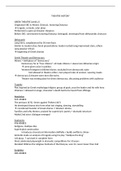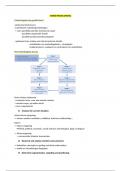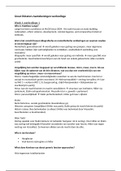Communication and leadership (lectures)
Week 2: Communication, mindset and goals
Lecture 1: Introduction (about the course)
Do it yourself day
Select a specific topic within the theme of the course
Create a web lecture or knowledge clip (10-20 min)
Create and run a workshop around this topic with the members of the other groups
as participants (60 mins)
About this course
Aim of the course = to combine theory and practice
Focus on effective interaction/communication
Interpersonal and (small) groups
Processes of influence
Skills in context (person and environment)
Lecture 2: Five axioms of human communication
Pragmatics of human communication
Syntactics = transmitting information
Semantics = meaning of communication
Pragmatics = behavioral effects of communication (= psychology)
Axioms (Watzlawick et al., 1967)
We cannot not communicate
o For example, ignoring someone is also communicating because it is sending a
powerful message
Content and relationship level
o Every communication has a content and a relationship aspect such that the
latter classifies the former and is therefore a metacommunication
Punctuation
o The nature of a relationship is contingent upon the punctuation of the
communicational sequences between the communicants
o “I got mad because you did something wrong” (causality, the sequence of
events)
Digital and analogic communication
o Human beings communicate both digitally and analogically
o Digital = verbal communication
o Analogical = non-verbal communication
Symmetrical or complementary
o All communicational interchanges are either symmetrical or complementary,
depending on whether they are based on equality or difference
o Symmetrical = at the same time
, o Complementary = when people with opposing communication styles
converse, e.g. when one person is dominant the other will turn shy)
Lecture 3: Mindset
Fixed mindset = idea that intelligence is a fixed trait that can’t be changed
Entity theory
Fixed mindset students adopt performance goals
Effort is negative, it should come naturally
“The main thing I want when I do my school work is to show how good I am at it”
Self-handicapping, feedback avoidance
Strategy after failure: helplessness, self-serving bias, downward comparison
o “I would spend less time on this subject from now on”
o “I would try to cheat on the next test”
Feeling smart when seeing something they already know, becomes frustrated when
seeing something attainable, disengages when seeing something unattainable
Growth mindset = intelligence is a malleable quality, a potential that can be developed
Incremental theory
Learning is most important
Work hard, effort is key
“It’s more important for me to learn things in my class than to get the best grades”
Strategy after failure: resilient, mastery-oriented, upward comparison
o “I would work harder in this class from now on”
Feeling bored when seeing something they already know, feels challenged when
seeing something attainable, remains effective when seeing something unattainable
Research effects of intelligence vs. effort praise
Effort praise works much better than intelligence praise (numbers of problems solved
on IQ test increased)
Motivation of growth-mindset grows more after intervention than control group
Learning goals:
I hope to learn about effective forms of communication
I hope to learn about different styles of leadership
Week 2: Communication, mindset and goals
Lecture 1: Introduction (about the course)
Do it yourself day
Select a specific topic within the theme of the course
Create a web lecture or knowledge clip (10-20 min)
Create and run a workshop around this topic with the members of the other groups
as participants (60 mins)
About this course
Aim of the course = to combine theory and practice
Focus on effective interaction/communication
Interpersonal and (small) groups
Processes of influence
Skills in context (person and environment)
Lecture 2: Five axioms of human communication
Pragmatics of human communication
Syntactics = transmitting information
Semantics = meaning of communication
Pragmatics = behavioral effects of communication (= psychology)
Axioms (Watzlawick et al., 1967)
We cannot not communicate
o For example, ignoring someone is also communicating because it is sending a
powerful message
Content and relationship level
o Every communication has a content and a relationship aspect such that the
latter classifies the former and is therefore a metacommunication
Punctuation
o The nature of a relationship is contingent upon the punctuation of the
communicational sequences between the communicants
o “I got mad because you did something wrong” (causality, the sequence of
events)
Digital and analogic communication
o Human beings communicate both digitally and analogically
o Digital = verbal communication
o Analogical = non-verbal communication
Symmetrical or complementary
o All communicational interchanges are either symmetrical or complementary,
depending on whether they are based on equality or difference
o Symmetrical = at the same time
, o Complementary = when people with opposing communication styles
converse, e.g. when one person is dominant the other will turn shy)
Lecture 3: Mindset
Fixed mindset = idea that intelligence is a fixed trait that can’t be changed
Entity theory
Fixed mindset students adopt performance goals
Effort is negative, it should come naturally
“The main thing I want when I do my school work is to show how good I am at it”
Self-handicapping, feedback avoidance
Strategy after failure: helplessness, self-serving bias, downward comparison
o “I would spend less time on this subject from now on”
o “I would try to cheat on the next test”
Feeling smart when seeing something they already know, becomes frustrated when
seeing something attainable, disengages when seeing something unattainable
Growth mindset = intelligence is a malleable quality, a potential that can be developed
Incremental theory
Learning is most important
Work hard, effort is key
“It’s more important for me to learn things in my class than to get the best grades”
Strategy after failure: resilient, mastery-oriented, upward comparison
o “I would work harder in this class from now on”
Feeling bored when seeing something they already know, feels challenged when
seeing something attainable, remains effective when seeing something unattainable
Research effects of intelligence vs. effort praise
Effort praise works much better than intelligence praise (numbers of problems solved
on IQ test increased)
Motivation of growth-mindset grows more after intervention than control group
Learning goals:
I hope to learn about effective forms of communication
I hope to learn about different styles of leadership











